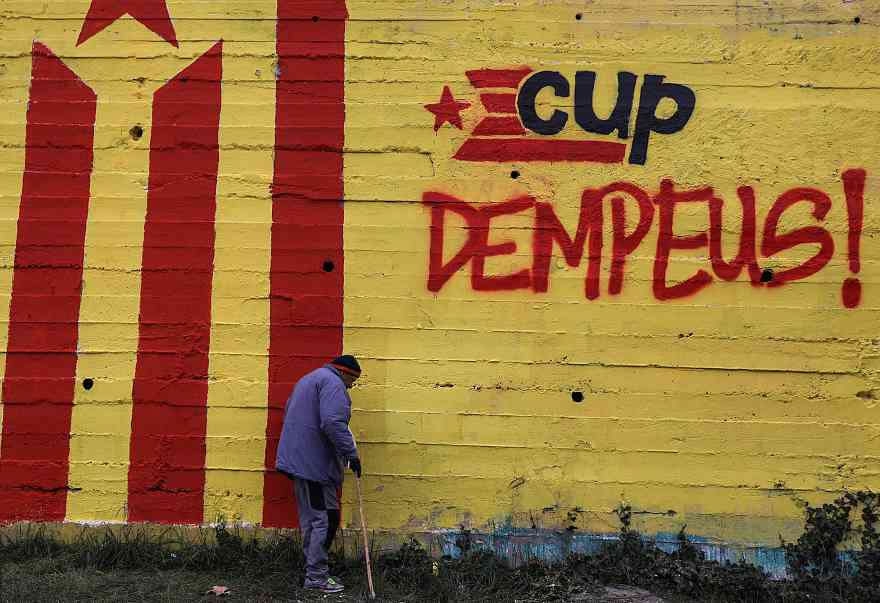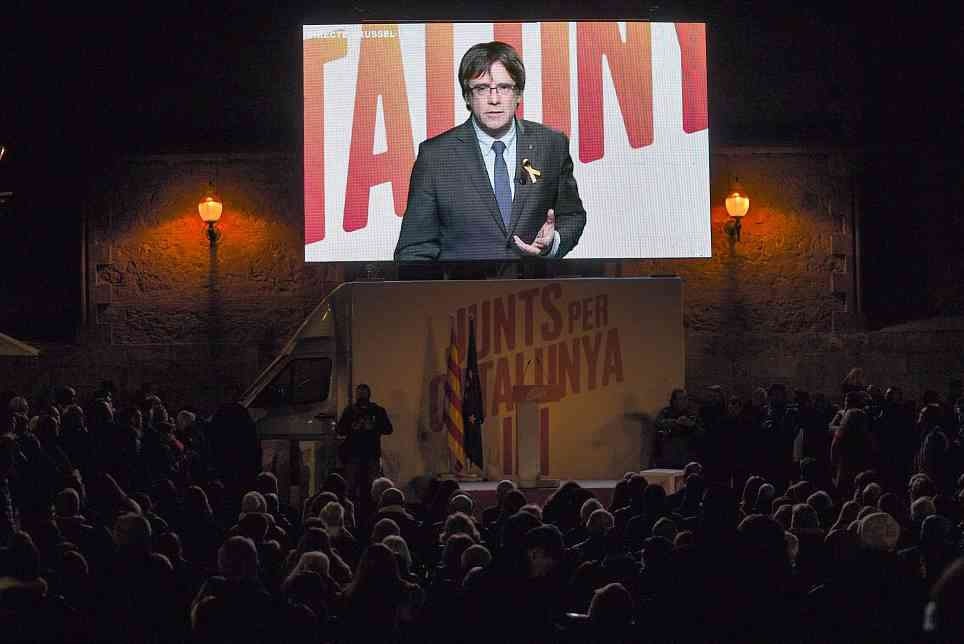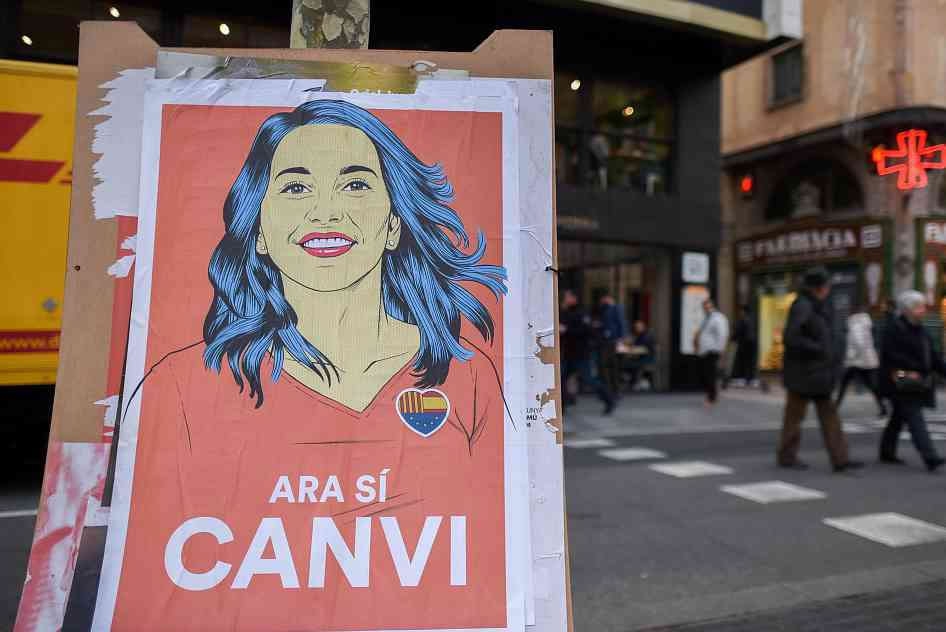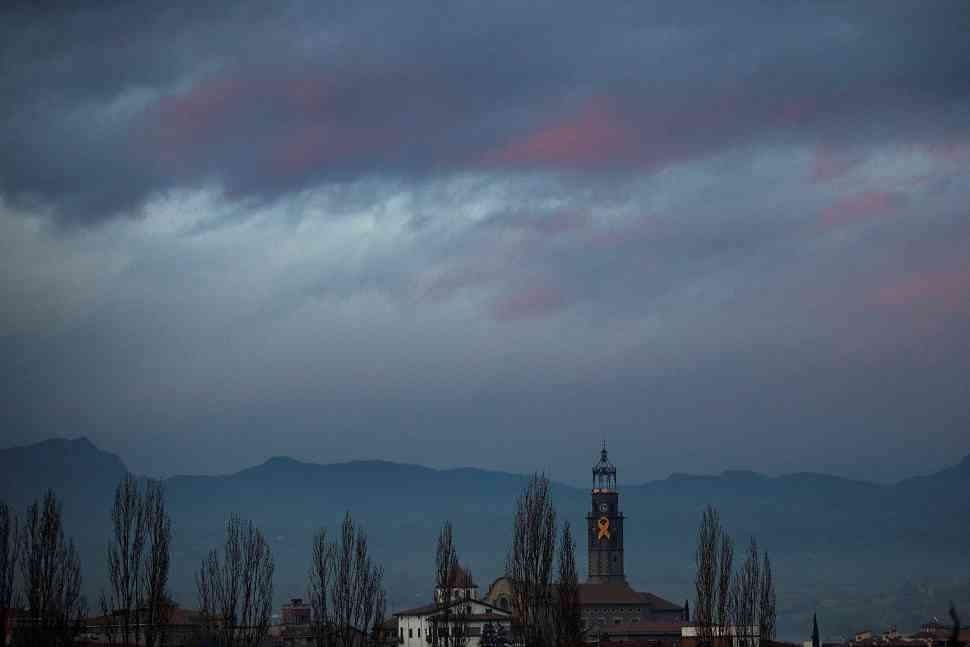Political parties tend to exaggerate the “importance” and “extraordinariness” of electoral contests in order to motivate potential voters.
No need for it on this occasion.
The December 21 elections in Catalonia are far from normal. In 2006, Catalonia approved a new supreme law (Catalan Statute), just below Spanish Constitution on legislative primacy. At that moment, a steady 25 percent of the population supported independence with the vast majority wanting to stick with the status quo.
But such approval with the established order has waned, to say the least. Dissatisfaction has grown at the way the region and the country has been managed by Spanish institutions as they have rejected articles already voted for by a majority of Catalans.

A man stands next to graffiti on a pro-independence wall painting that reads "stand up!" in Manresa, Spain December 18, 2017. / VCG Photo
A man stands next to graffiti on a pro-independence wall painting that reads "stand up!" in Manresa, Spain December 18, 2017. / VCG Photo
From then on Catalan society has increasingly felt the need to exercise what is named as the “right to decide”. In other words, to have a referendum for independence similar to the ones held by Quebec and Scotland in recent years. Also a very significant number of Catalan citizens have moved ideologically to pro-independence positions. Political debate has been completely monopolized by such issues, mostly in Catalonia, but also in the rest of Spain.
On October 1, the Catalan government finally developed such a referendum. Though electoral guarantees were rather low and with major questions over its democratic legitimacy, more than 2 million Catalans (above a 40 percent of voters) took part, with a massive 90-percent support for independence.
The election was considered illegal by Spanish institutions. As a consequence, the Catalan Government decided to declare independence unilaterally, while the Spanish Government initiated a crackdown the same day as the referendum. Spanish police tried to stop people voting by violently removing urns; the images of brutality spread quickly worldwide on social networks and media.

December 19, 2017 - Barcelona, Spain: Pro-independence Catalans listen to ousted Catalan president Carles Puigdemont as he delivers a live speech from Belgium during an electoral rally, two days before a key regional election. / VCG Photo
December 19, 2017 - Barcelona, Spain: Pro-independence Catalans listen to ousted Catalan president Carles Puigdemont as he delivers a live speech from Belgium during an electoral rally, two days before a key regional election. / VCG Photo
Regardless of the scrupulously nonviolent character of the pro-independence movement from then on, Spain turned to the courts to fight over the referendum. Based on a strict application of the Spanish Constitution, the Spanish Prime Minister Mariano Rajoy dismissed the whole Catalan Government, imprisoning civil society pro-independence leaders. Former members of the Catalan Government had to decide whether to stay in Catalonia and risk imprisonment, as happened to ERC (Republican Left of Catalonia) leader Oriol Junqueres, or to flee the country, as former President Carles Puigdemont did.
In political terms, Catalonia’s autonomy from the Spanish central government has been dramatically reduced, and even the decision of calling new elections was made not by the Catalan Government, but by the Spanish one.
Taking into account this context, Thursdays' elections are crucial and exceptional.
Almost all contending parties are divided on two blocks: in favor or against Catalan independence. The situation is so polarized that the electoral expectations of the only party without a clear stance on the matter, Catalunya En Comú, are very low.

December 19, 2017 - Barcelona, Spain: Electoral posters showing the pro-unity leader Ines Arrimadas in the streets of Barcelone, two days before a key regional election. Ines Arrimadas is the leader of the Ciutadans party, a centre-right party whose popularity rose as it opposed Catalonia's pro-independence movement. / VCG Pho
December 19, 2017 - Barcelona, Spain: Electoral posters showing the pro-unity leader Ines Arrimadas in the streets of Barcelone, two days before a key regional election. Ines Arrimadas is the leader of the Ciutadans party, a centre-right party whose popularity rose as it opposed Catalonia's pro-independence movement. / VCG Pho
The latest polls forecast a relatively similar electoral turnout for both blocks, though a small advantage for pro-independence parties is predicted (46 percent to 44 percent). But Catalan electoral law is biased in favor of territories where independence sentiments are stronger, and that allows former governing forces to hope for the possibility of a repeat majority.
So will they follow the same road and go for another referendum risking another “failure”, and possible imprisonment? Will they give up their political aspirations for independence? The most likely outcome will be a renewal of the pressure to European countries to force the Spanish Government to come to some kind of political solution.

A yellow ribbon, which represents the request for the release of jailed Catalan activists and leaders, is seen in the belfry of a church in Manlleu, Spain December 18, 2017. / VCG Photo
A yellow ribbon, which represents the request for the release of jailed Catalan activists and leaders, is seen in the belfry of a church in Manlleu, Spain December 18, 2017. / VCG Photo
The electoral polls do show a small gap that would allow “unionists” to hope for a historical “sorpasso”, or way to “overtake” their independence rivals. Paradoxically those parties against the idea of Catalonia voting again on independence would be the ones who would benefit most from a high voter turnout. If voter participation goes above of 80 percent (some polls predict close to 85 percent), a unionist Government should be expected.
Whatever the outcome, the fate of Catalonia, and Spain, will be determined for the next few years. Recalling the words of Catalan poet Miquel Martí Pol, “Everything is yet to be done and everything is possible”.
(Pablo Aguiar is researcher at the International Catalan Institute for Peace (ICIP) and teaches International Relations at the Barcelona Autonomous University (UAB). Nowadays he leads the organization of a local electoral observation mission for 21D Catalan elections (ODEM). The article reflects the author’s opinion, and not necessarily the views of CGTN.)






